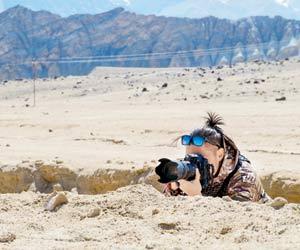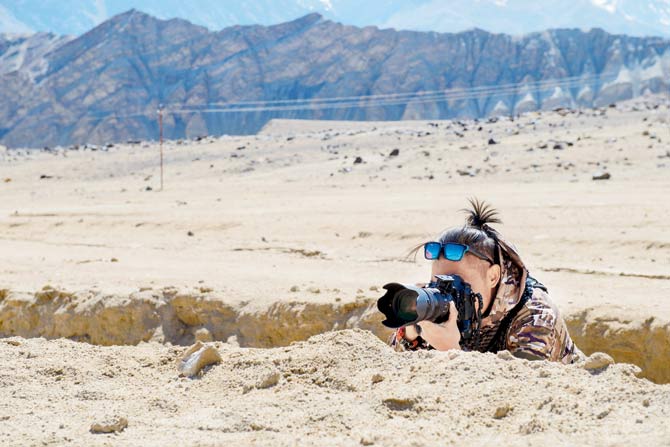Is a journalist really all that different from a soldier? One protects us from outside threats, the other guards us from domestic dangers

I recently attended my neighbour VN's 50th birthday party and met other neighbours, business associates, and school friends of his. One was a Colonel in the ordinance corps who apparently was once a mischievous boy. We bumped into each other at the bar. After the usual small talk, Colonel Saheb asked: "Don't journalists ever stop and look at themselves, at what they are doing?" When people ask such questions, they usually do with certain TV anchors or editors in mind. I still object. What kind of question is it anyway?
ADVERTISEMENT

A journalist who takes personal risk to cover a riot or an insurgency is as courageous as the soldier in a bunker shooting at the enemy. Representation pic/Thinkstock
First, journalists do nothing wrong. What they do is their job: To inform the public, and to act as a watchdog of democratic institutions, including government. It is fashionable of late to smear journalists merely because they ask tough questions of the government or of the party in power. That's their job! Such smear is not exclusive to India: US President Donald Trump is forever deriding CNN and the New York Times as fake news, though unlike craven Indian news outlets, the American media does not back down from a confrontation with the White House.
Second, as uncomfortable as journalists' questions might get, they do not resort to abuse. I pointed out to Colonel Saheb that his own former army chief, now a Union minister, early on used the ugly term "presstitute".
Third, journalists don't drop into society from another planet. Like Prime Minister Narendra Modi or Lalu Yadav or Rahul Gandhi, they are a part and parcel of our stratified society. Indians are hypocritical: On one hand we feel pride that more than any country we are able to celebrate the cliché, 'unity in diversity'; yet at the same time, we succumb to paranoia and fear about that diversity when it comes to elections and political mobilisation. True, journalists should actually look at themselves, but only when our entire society - including our military men - undertakes honest introspection and self-examination.
Fourth, soldiers don't have a monopoly on patriotism. There are enough cases of cowardice, corruption and even treason on record against members of the military. Many soldiers don't join the military to make the ultimate sacrifice, but because they need a job or they're under family pressure. A journalist who takes personal risk to cover a riot or an insurgency is as courageous as the soldier in a bunker shooting at the enemy on an opposing hilltop.
I have respect for soldiers - as I do for doctors, scientists, teachers, entrepreneurs, sportspersons, and even other journalists. But another encounter during the past two years saddened me about the attitude of uniformed personnel towards the media. I'm currently working on a non-fiction book for which I've had to conduct interviews and hold conversations, and one participant is a retired army General. We're cordial, but I have noticed the disdain he has of the media, and his wariness of me at the start of my project - to the point that I had to overlook a bit of rudeness to get on with my job. He seemed to think the media was not only loud and unnecessary, but that it got in the way of important work.
Important work? If the media isn't vigilant, governance detrimental to individual rights, under the guise of 'important work' would be the norm. (Should the government increase petrol tax to 100 per cent, for instance, and get away with it unquestioned?) The media helps mediate public debate on what exactly is more important - a civil nuclear deal with the USA, for instance, or the Right To Information Act. We remind the public not to be blindly trusting of government.
It's perhaps also a matter of temperament. The retired General has spent his life in a highly regimented and disciplined milieu, with set rules, necessary in order to for an army to become a well-mechanised, mammoth, fighting machine. As a journalist in the late '80s and early '90s, I broke bread with terrorists in Punjab and in Kashmir. As a crime reporter, I drank with policemen. It is an undisciplined life and there are no rules, so that you can interact at different levels of society. Even our day-to-day schedule is undisciplined, though with a rigorous structure; every night a newspaper has to be produced, on time. Many journalists go to sleep at the same time as Emergency room workers. Soldiers and journalists are opposites in this approach to life. With this in mind, I was sympathetic and forgiving of the retired General, despite his best efforts.
At VN's birthday party, the Colonel and I shook hands and ended our debate. We ordered drinks and discovered that soldiers and journalists have at least one thing in common: The love of a peg (or two) of rum each night before dinner. Truly, there is unity in diversity.
Aditya Sinha's crime novel, The CEO Who Lost His Head, is available now. He tweets @autumnshade. Send your feedback to mailbag@mid-day.com
Download the new mid-day Android and iOS apps to get updates on all the latest and trending stories on the go
 Subscribe today by clicking the link and stay updated with the latest news!" Click here!
Subscribe today by clicking the link and stay updated with the latest news!" Click here!






